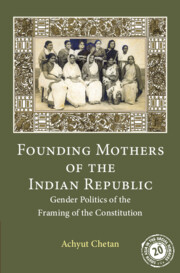Book contents
- Frontmatter
- Dedication
- Contents
- List of Images
- Preface
- Acknowledgements
- List of Abbreviations
- Introduction: Towards a Feminist Reading of the Making of the Constitution
- 1 In the Shadow of the Founding Fathers
- 2 In Search of the Missing Mothers
- 3 Women’s Moral Imaginary and Constitutional Politics: 1927–1946
- 4 Patterns of Participation: Women Members in the Constituent Assembly
- 5 Writing the Rights: Inscribing Constitutional Morality
- 6 Reformulating the ‘Woman Question’: Challenging Customs and Traditions
- 7 After the Framing
- Conclusion: Remembering the Founding Mothers
- Appendix: Texts and Contexts of the Framing – A Timeline
- Bibliography
- Index
3 - Women’s Moral Imaginary and Constitutional Politics: 1927–1946
Published online by Cambridge University Press: 27 September 2022
- Frontmatter
- Dedication
- Contents
- List of Images
- Preface
- Acknowledgements
- List of Abbreviations
- Introduction: Towards a Feminist Reading of the Making of the Constitution
- 1 In the Shadow of the Founding Fathers
- 2 In Search of the Missing Mothers
- 3 Women’s Moral Imaginary and Constitutional Politics: 1927–1946
- 4 Patterns of Participation: Women Members in the Constituent Assembly
- 5 Writing the Rights: Inscribing Constitutional Morality
- 6 Reformulating the ‘Woman Question’: Challenging Customs and Traditions
- 7 After the Framing
- Conclusion: Remembering the Founding Mothers
- Appendix: Texts and Contexts of the Framing – A Timeline
- Bibliography
- Index
Summary
The women of India are no longer willing to submit to standards, whether local, political or ethical, which have been set for them by the male conscience of the community.
—Amrit Kaur, speech in Jullundur, 1932Three major women's organizations were founded in India after the First World War: the Women's Indian Association (WIA) founded by the Irish theosophist and feminist Margaret Cousins in 1917, the National Council of Women in India (NCWI) founded by Mehribai Tata and her associates in 1925, and the All India Women's Conference (AIWC) founded in 1927. According to Geraldine Forbes, ‘the presence of the self-respect movement [led by Periyar] had helped limit the appeal of the WIA in southern India to high-caste women’ while the NCWI ‘failed to grow and become a vital national organization because of its elitism’. The AIWC, the last to be formed, was ‘the most truly Indian of the three organizations’ and by the time of the formation of the Constituent Assembly, was the most recognized platform of the women's movement in India.
The most active women members of the Assembly had all been important members of the AIWC, playing significant roles in its committees of legal disability, labour, economic rights, education, and constitutional principles. Kamaladevi Chattopadhyay, Hansa Mehta, and Amrit Kaur were among the AIWC's founding members, and had regularly served on its Standing Committee. Hansa Mehta herself was the President of the AIWC at the time of her election to the Constituent Assembly, an office that Amrit Kaur had held more than once in the past. Qudsia Aizaz Rasul had been its Vice President and Renuka Ray had led the AIWC's legal reform movement. These women and other members of the AIWC had contributed to a significant realignment of the social and the political through a sustained exercise of redefinition of these categories. Half a century after its foundation, when Kamaladevi Chattopadhyay recounted the history of the women's movement in India, she had described the AIWC as ‘the earliest national body of women which funnelled women's aspirations, plans, projects, and focussed its achievements and failures’.She called it the voice of ‘a concise, authentic national women's movement from the twenties’.
While Kamaladevi claimed the AIWC spoke for Indian women, others criticized the organization's internal and external practices. One instance of this was the Dalit women's report of the practice of caste-prejudice in one of its meetings.
- Type
- Chapter
- Information
- Founding Mothers of the Indian RepublicGender Politics of the Framing of the Constitution, pp. 77 - 120Publisher: Cambridge University PressPrint publication year: 2023



